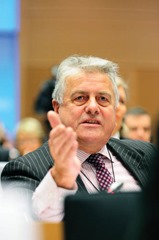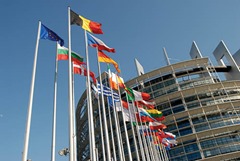A maturing Parliament
 Jim Nicholson sees the European Parliament becoming more responsible by accepting a frozen budget alongside its enhanced powers. He discusses its relevance to Northern Ireland with Peter Cheney.
Jim Nicholson sees the European Parliament becoming more responsible by accepting a frozen budget alongside its enhanced powers. He discusses its relevance to Northern Ireland with Peter Cheney.
MEPs must use their powers responsibly on behalf of voters, Jim Nicholson says as he takes stock of the current state of Europe. In a wide-ranging interview with agendaNi, Nicholson is keen to point out that the European Parliament is “maturing” by accepting a real terms freeze in the EU budget rather than its previous attitude of “spend, spend, spend.”
The outgoing Parliament was the first one to operate under the Lisbon Treaty, which granted it the power of co-decision in many policy areas. This means that the Parliament is equal to the Council of Ministers when making EU laws. “We could no longer blame everybody else for what was going wrong,” he remarks. “We actually had an input ourselves.” Nicholson’s European Conservative and Reformist group pushed for a freeze alongside the UK Government. “It’s time to contract, be sensible and go forward with sensible policies and let the people see that we are a responsible Parliament,” he states.
Achievements
The veteran MEP focused “very strongly” on CAP reform, spending 360 hours working on it in Brussels. “I wouldn’t pretend that we got everything we wanted because we didn’t,” he explains, “but at the end of the day, if we hadn’t had been there, it would have been an awful lot worse.”
In particular, he was the rapporteur for the dairy package – a learning process as it was one of the first proposals to go through the Agriculture Committee under co-decision. He is now the committee’s rapporteur for the Transatlantic Trade and Investment Partnership (TTIP), looking at the implications of a US-EU free trade agreement for farmers. These are “early days” for TTIP but he predicts that it will be the main topic on the EU agenda by the spring of 2015.
Farmers and small business owners often fear that free trade deals will damage their interests and put big business first. Nicholson has discussed these worries with Ken Clarke – the UK’s trade envoy.
“There’s a vast chasm of divergence between where we stand and where the US stands,” he adds, with American food producers pushing to get into the European market. However, American agriculture works to lower standards in environmental health and animal welfare.
On the Environment, Public Health and Food Safety Committee, he has promoted e-health and worked on how to protect Europe’s bee population. The Peace IV funding package was achieved and, working with other MEPs, he ensured that local SMEs would benefit from the Horizon 2020 research funding programme.
A special European Parliament committee on organised crime, corruption and money laundering was set up in 2012 and Nicholson has been the group’s representative. Assistant Chief Constable Drew Harris gave evidence to the committee about how the PSNI was working with An Garda Síochána and other forces across Europe to tackle cross-border crime.
To take a local example, Nicholson highlights diesel laundering in South Armagh and last year’s horsemeat scandal which also involved investigations in the border area.
“Why is nobody ever charged for these things?” he asks. “What are the PSNI doing? Where is the law back home because they’re breaking the law? If they’re catching people in the act at these places of work, why are people not being charged?”
In a response, a PSNI spokesman said that it was working closely with HM Revenue and Customs, the Department of Agriculture and Rural Development, Food Standards Agency and councils. The PSNI would “always act on concerns and information from the community” and he encouraged members of the public to contact local police officers.
Influence
 The job of the MEP “is in Brussels” and Nicholson spends as much time as possible in the city in order to represent Northern Ireland.
The job of the MEP “is in Brussels” and Nicholson spends as much time as possible in the city in order to represent Northern Ireland.
“You can’t influence Europe by sitting back home and that’s the bottom line,” he states. Northern Ireland is a small region in European terms but “we do box way above our weight.”
Nicholson sees the Office of the Northern Ireland Executive as playing a “very useful role” in identifying potential problems at an early stage. He always encourages Executive ministers to come out to Brussels and meet commissioners and other officials. The First Minister and deputy First Minister, in his view, should be visiting at least once a year and preferably twice a year.
“I would suggest that coming to Brussels would be equally, if not more, important than all the time they spend in Washington quite frankly,” Nicholson continues. “That is how you actually up the ante here.”
Horizon 2020 presents major opportunities for Northern Ireland but applicants (such as companies and research centres) need the right information and tutoring to obtain that funding.
“We could probably do it better,” he says of the Executive’s support for those applying for the programme. “And that’s not being critical. I’m just facing reality. I work on the principle of no matter how good you think you are, you can always do better.”
Northern Ireland, Nicholson adds, can only build its private sector by embracing new technology (especially in renewable energy) but it cannot make progress by isolating itself from its European neighbours. “We’re never going to do this on our own,” he says in conclusion. “We’ve got to depend on others and to work with others.”
Risks in Ukraine
The interview took place as EU heads of government were gathering to discuss the crisis in the Ukraine. Nicholson found the situation “very worrying” and warned: “This could have a long-term effect. If this escalates – and it isn’t over yet – the big problem is Putin can turn a tap and turn off 40-50 per cent of the energy supply to major countries in Europe.”
A UN-administered neutral zone between Europe and Russia seemed to him to be the best way forward. Names like Crimea Street and Sevastopol Street in Belfast were also reminders of the Crimean War – a military intervention which involved Britain, France, Turkey and Italy.
“We’ve seen enough wars,” he reflected. “We’ve seen enough people making the supreme sacrifice in countries like Afghanistan and Iraq.”





